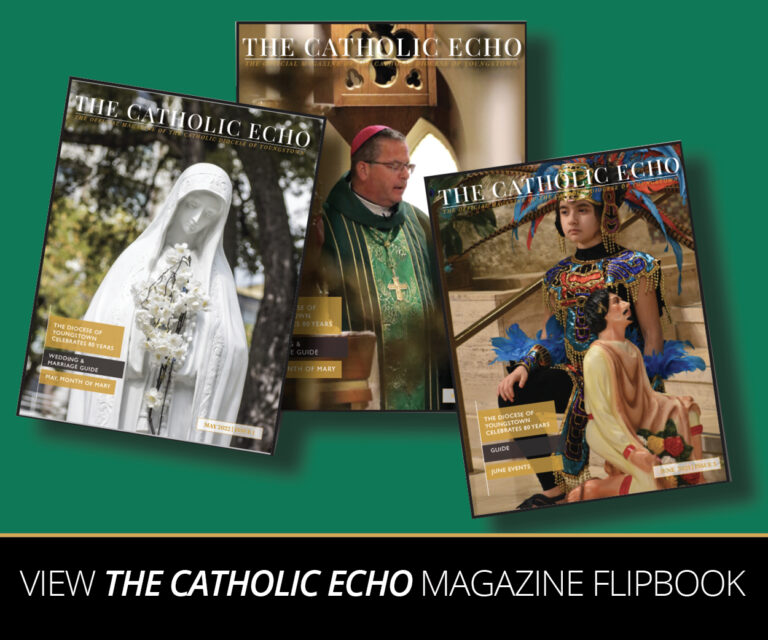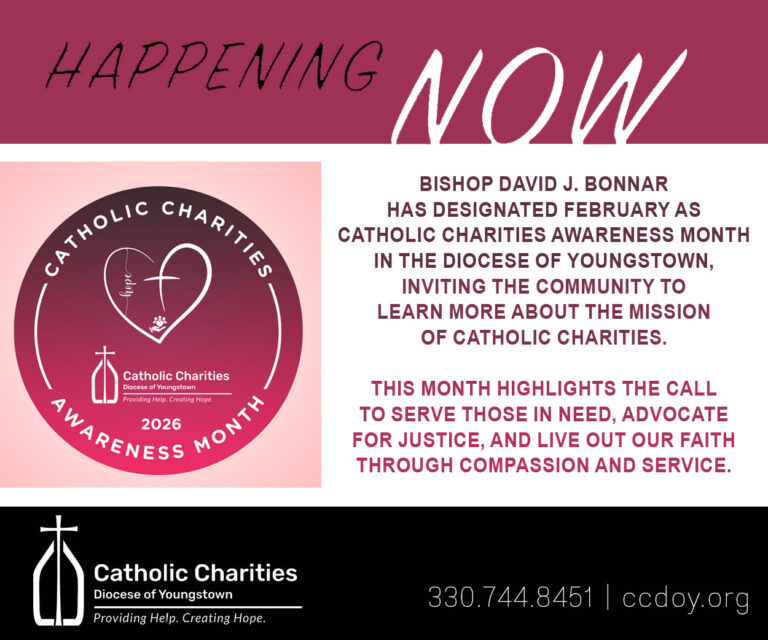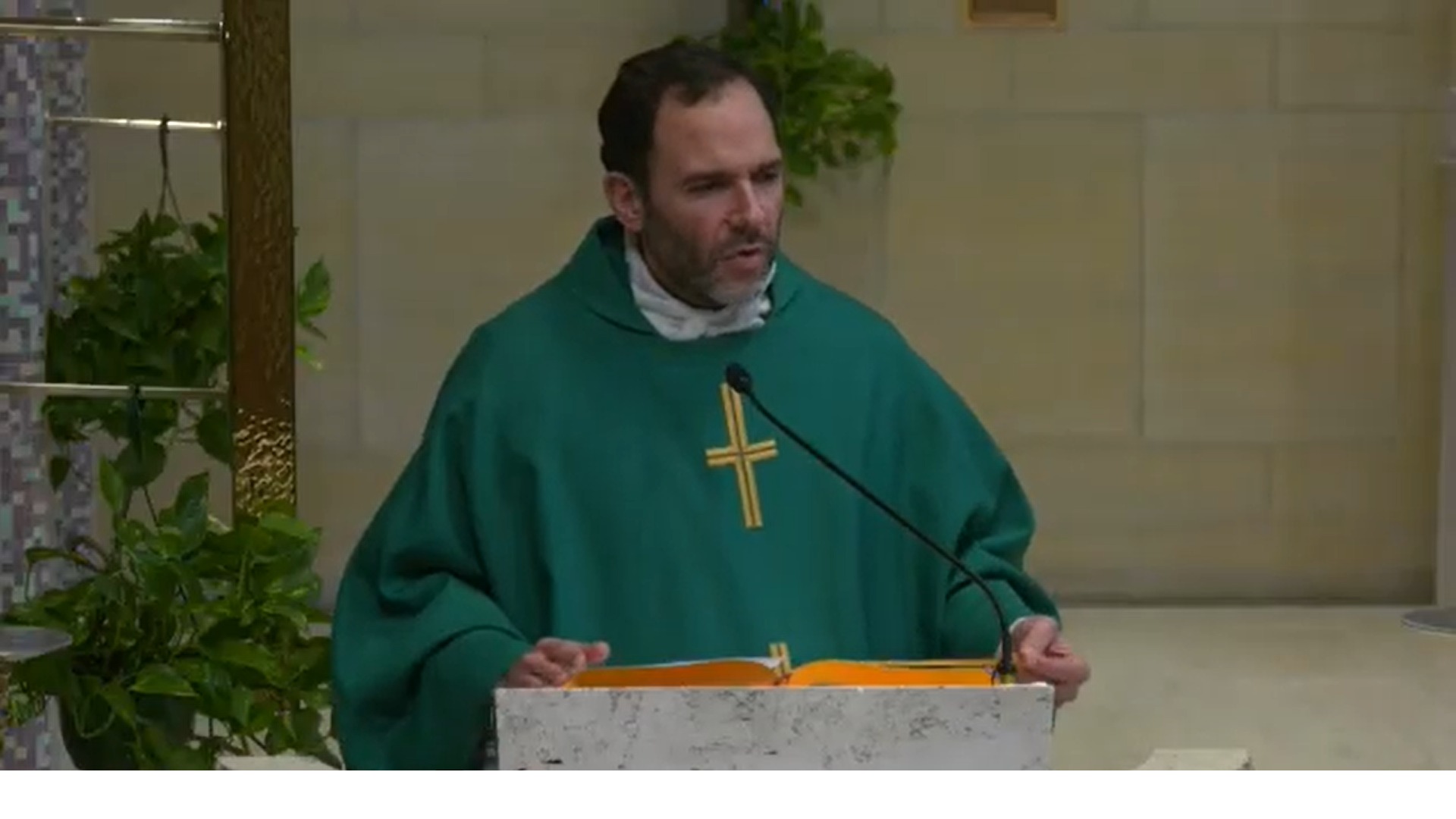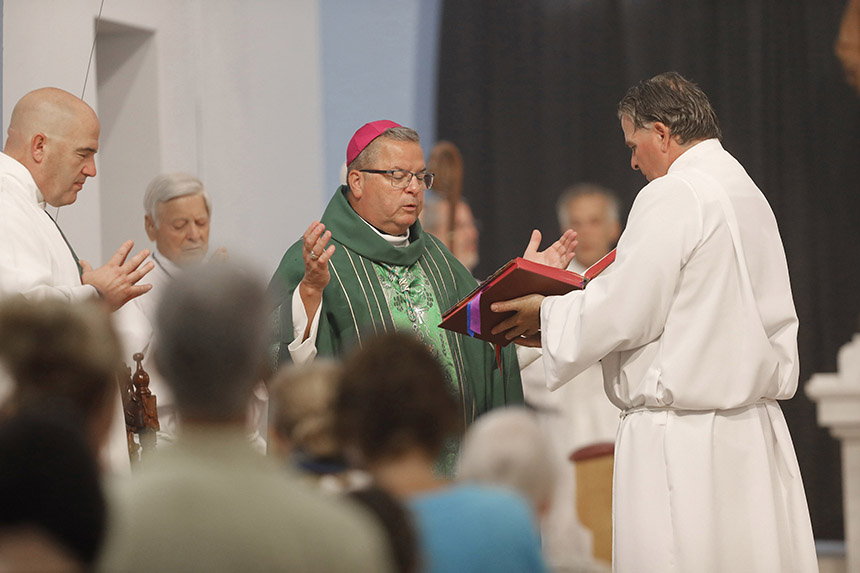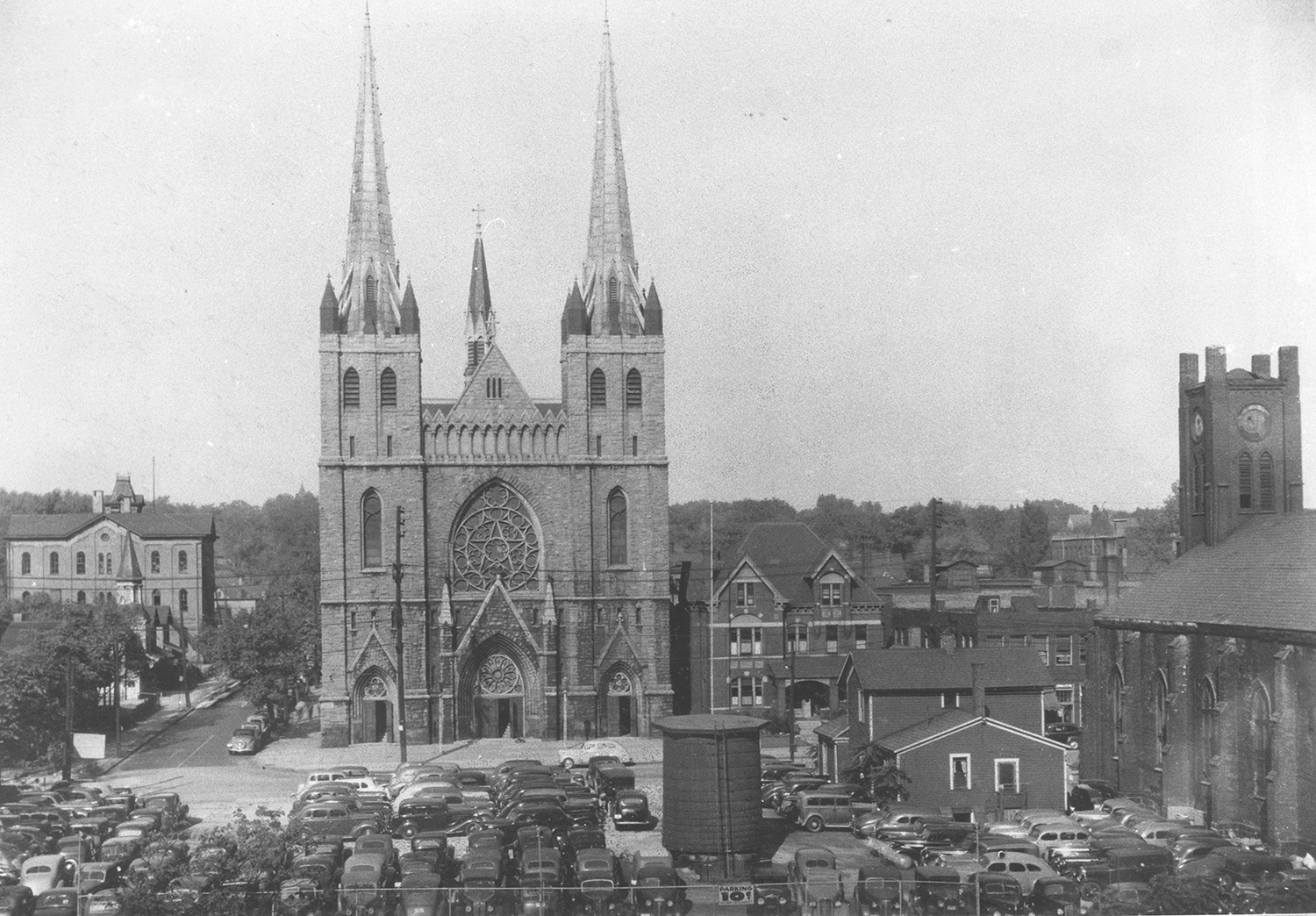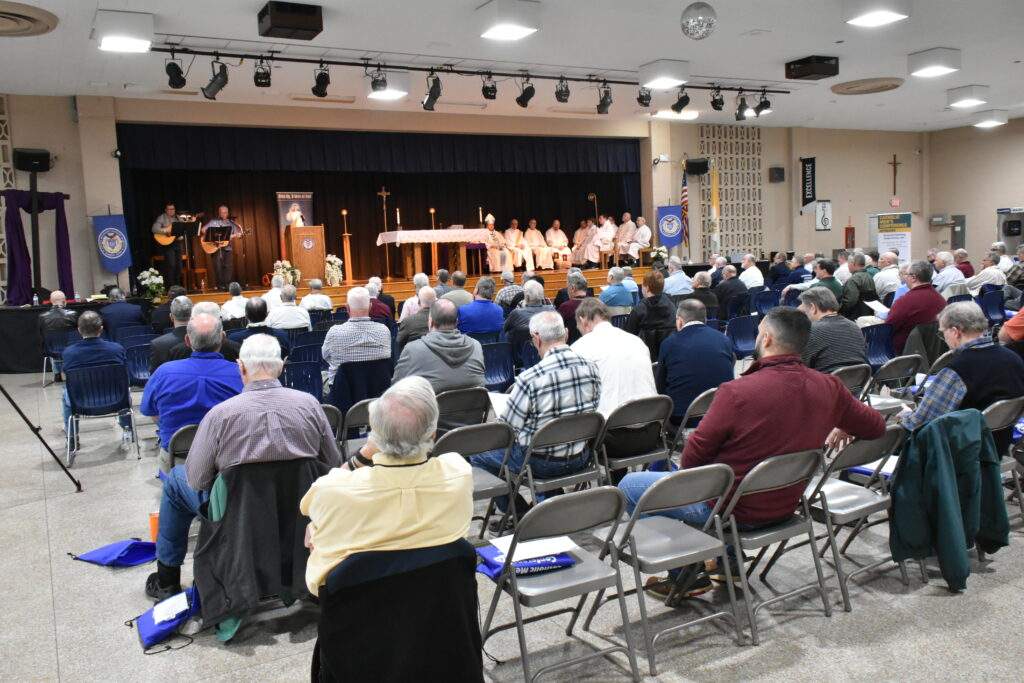
“What drives you gentlemen, in your lives?” This is the question Bishop David Bonnar asked nearly 150 priests, deacons and laymen at the Youngstown Diocese’s Catholic Men’s Fellowship Conference. The event took place on the Feast of the Annunciation of Our Lord, March 25, at Warren John F. Kennedy Catholic High School. Bishop Bonnar used the Annunciation as the topic for the homily at Mass to inspire those attending to go forth and spread the Gospel.
Other conference speakers focused on the Eucharist and the Eucharist Revival in dioceses across the United States. These included Father Ryan Furlong, Dr. Ben Safranski and Father John-Michael Lavelle. Men also had the chance to pray the Rosary, sing hymns and attend an Exposition of the Blessed Sacrament.
“What drove Mary in her life?” Bishop Bonnar asked. He said that when he was a seminarian he attended a Christology class in Rome. One day during class the professor said, “Mary’s fiat drove her to the cross.” Her fiat, or decree, was “let it be done to me as you say.” But being in Italy, the class broke out in laughter because they had the image of Mary driving her little Fiat automobile to Calvary, he said.
“What can we, as men, take away from our reflection of this sacred moment in salvation history?” the bishop asked. “First, there is the announcement that is at the heart of what we celebrate today in the Annunciation. God speaks to Mary through an angel and tells her that she will become the mother of God. The announcement, which deeply troubles Mary, the teenager who is not married, is wrapped in the reassuring words that ripple throughout sacred scripture, ‘Do not be afraid.’”
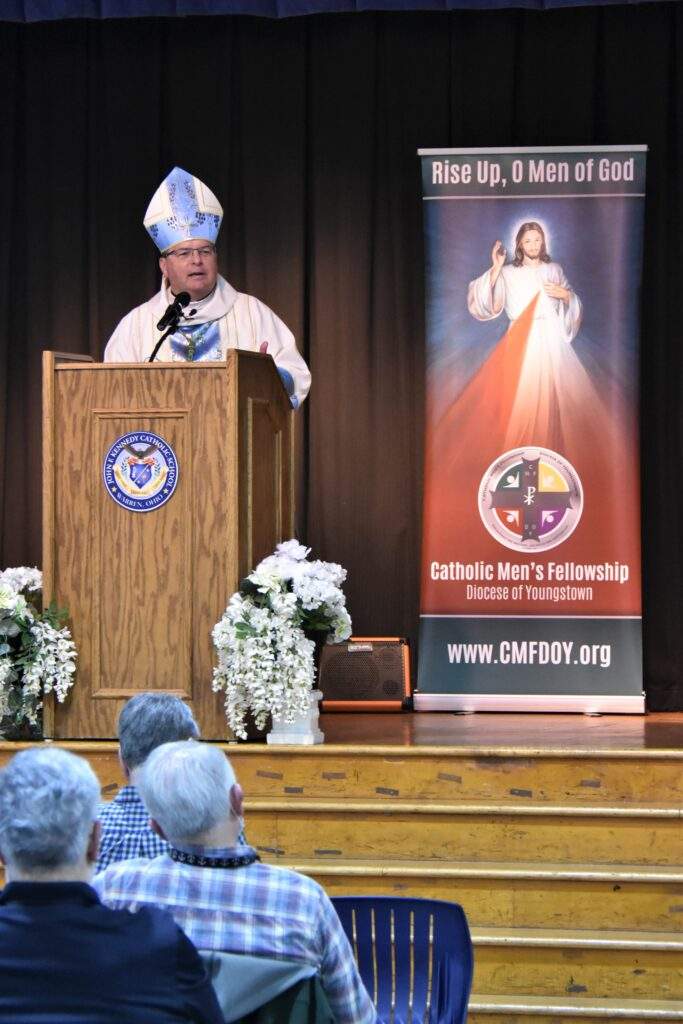
He went on to say, “This reassurance by the angel is also contained in these words, ‘The Holy Spirit will come upon you, and the power of the Most High will overshadow you.’ Such an image points to the grace and power of the Holy Spirit. This same powerful and overshadowing Spirit is given to each and every one of us.”
Bishop Bonnar added, “Second, there is the response of Mary in the face of this mysterious encounter. Mary simply says, ‘Behold, I am the handmaid of the Lord. May it be done to me according to your word.’ Mary surrenders with her fiat. She demonstrates trust even though she does not understand the full reality of it. For this reason, Mary is often referred to as the first disciple.”
He also said, “Third, this sacred announcement by the angel, upon further review, demonstrates to us the critical role she plays, not only in God’s plan, but in our lives. For Mary is not only a disciple but a model for us in discipleship. And yet, we come to discover at the cross that Mary is even more. She is our mother, for before breathing his last, Jesus turned to Mary and said, ‘Woman, behold your son.’ And then he turned to the disciple whom he loved and said, ‘Behold your mother.’ Mary is Jesus’ gift to us.”
Bishop Bonnar urged everyone to pray the Rosary. “With each Hail Mary, we ask Mary to ‘pray for us sinners, now and at the hour of our death. Amen,” he said. “This is also a good time for us to ask ourselves, ‘Who or what drives us every day in our lives?’”
After Mass, the bishop concluded, “It’s your turn to go out and speak. Be witnesses to Jesus and Mary.”
In his presentation, Safranski asked “Does God want us to be happy?” He stressed the difference between happiness and joy.
Safranski is director of religious education at Christ Our Savior Parish in Struthers. He is also a part-time instructor at Franciscan University of Steubenville.
“Happiness is a mostly a feeling that comes on us because of things outside of our control,” he said. “Sometimes our job makes us happy, sometimes we are happy with our children.”
But he said the best definition of Joy is “a deep abiding sense of well-being. Joy is something we can choose.” The basis for it is always there. It is knowledge that God is here with us. He stressed that Christ came to give us abundance of life and every second he watches us. He also shows us we are valuable to God.
How do we make Christ a larger, more permanent portion of our lives? Safranski asked. He quoted the scripture passage when Christ said, “Whoever eats my flesh and drinks my blood remains in me and I in him.”
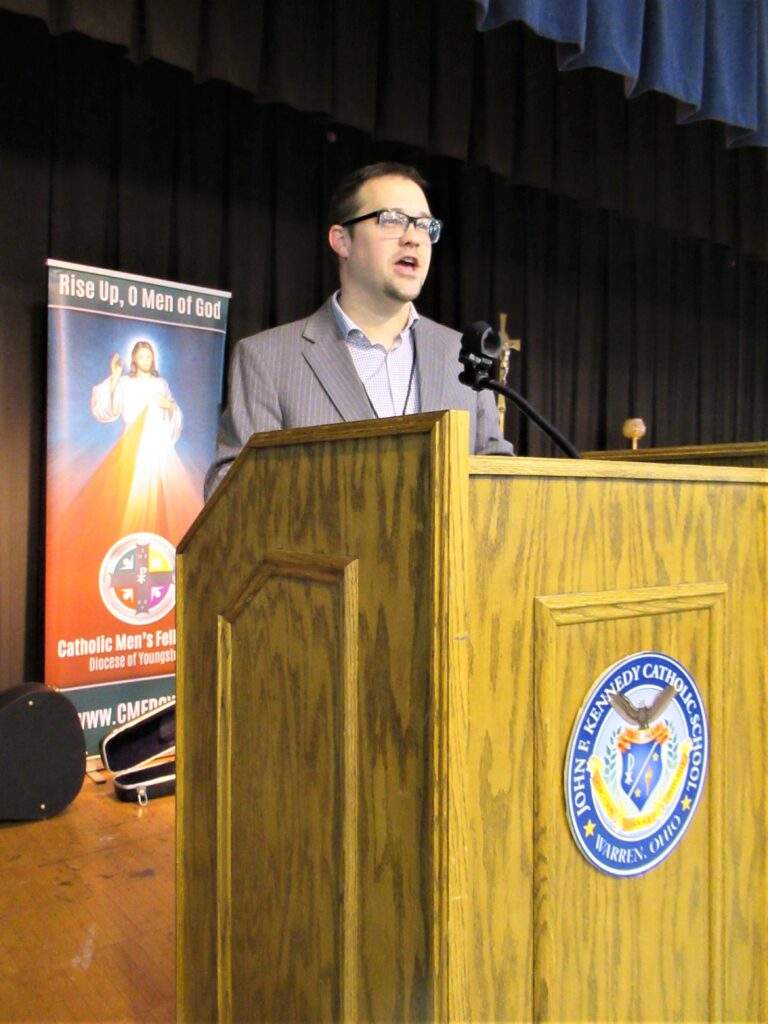
He added that once you have known the life given by Christ, “You can’t accept any other life.”
“The Eucharist is the biggest, best, primary way that God has given us to have the life of Christ within us,” Safranski said. “To make us better, to make us more joyful, to give us the grace to worship Him.”
He added, however, “We know that just the physical act of receiving the Eucharist does not turn us magically to joyful, Christ-centered people. It is not a magic bullet.”
He compared it to buying a lottery ticket. If a person has the winning numbers, he must first turn in the ticket to the lottery office, do the necessary paperwork and pay taxes before getting the money.
“In other words, it is totally possible to possess something and not choose to use it, Safranski said. “Any gift that we get must be actively received, opened and used. A lot of times, I think we are a bunch of guys with lottery tickets in our pockets and not bothering to check the numbers.”
He encouraged audience members to meditate on the words of Scripture, especially Christ’s promises, and also the stories of God’s faithfulness to his people.
“I’m just struck by the fact that every time I read through the Old Testament, every story is about God’s faithfulness,” he said. “How God reaches out to us. How God reaches out to humanity. They are happy for a little while before messing up. Yet God is always guiding Israel to the promised land. Always drawing them to himself.”
He added, “We need to remember that even when we were in our darkest place, God brought us through.”
Safranski also said, “Lastly, I want you to spend dedicated time to Christ in the Eucharist” in adoration and prayer, in the presence of the tabernacle or during times of Exposition of the Blessed Sacrament. And he encouraged spending quiet time listening to God. “Take five minutes, 10 minutes in quiet time, and God will tell you that He is with you.”
He said “Christ never promised that you always will be happy. He is not promising that we will be free from suffering. But he promised that he will walk with us and that he will carry our cross with us, and the Eucharist is the Number One way in which he does this and the high point in which we worship Him.”
He concluded by saying, “What is going to happen if we really live with this joy? It is going to make us irresistibly attractive. Spiritually, what happens to a person who lives with that joy is that they spread the Gospel without trying, and the doors will be opened. Every single person in the world wants that. People are searching and so many have no idea how to find the joy they are looking for. Maybe they have never seen someone living the joy of Christ. We do know where to find this. As Bishop Bonnar said, it is our turn to go out and not just to have the joy, but show it to others.”
Father Lavelle called Mary “the greatest disciple of Christ,” saying that she is the first person to receive the Eucharist. “She received Christ when she said, ‘Let it be done according to your will’,” he said.
He discussed the need for the Eucharistic Revival and the various programs the diocese has planned. He recounted the Pew Research survey, which showed 7 out of 10 Catholics did not believe Christ is present in the Blessed Sacrament. For this reason, the United States Conference of Catholic Bishops started the three-year Eucharistic Revival. But Father Lavelle said this revival needs to continue beyond that.
He said the Church cannot live in the past, and does not know what the future will hold. It must live in the present. And it should revive some of the practices which may have fallen out of favor recently.
“One of these is the Eucharistic Procession,” Father Lavelle said. “We are called to take the Lord out into our neighborhoods, into our homes, into our workplaces when we leave the Mass. But the Eucharistic Procession is a visible way to witness. We need, as a Church, to revisit our tradition.”
He said the Revival began with Bishop Bonnar visiting each of the counties of the diocese. “And for the second six months, we have been doing Holy Hours.” This consists of spending time in silence before the Blessed Sacrament. “It’s difficult for some people to just shut up and listen for an hour. So we have broken it up with music, and with readings and psalms of praise.”
He added, “So this has really been a learning experience for some people, to just sit and listen to the voice of God.”
Father Lavelle also said, “On June 11, we will move into the parish year. We are encouraging parishes to have Holy Hours, Eucharistic Processions, catechesis about the Eucharist.” Pastors will also be encouraged to start small faith-sharing groups around the Eucharist, he added.
From July 17 to 21, 2024, he said 80,000 Catholics will visit Indianapolis to attend the National Eucharistic Congress. Father Lavelle said the diocese will have 125 free tickets, and they hope to bring at least one person from every parish.
He concluded that there is much division among people about the physical reception of the Eucharist. He called it “the pitfalls of personal piety or lack thereof.”
“We need to arrive at a greater sense of communion, in how we come together and how we leave,” he said. Jesus is truly present in the Eucharist, but he won’t be trapped by our lack of reverence. We have to be collaborators in the true presence of Christ, not just at Mass, but as we go forth.”
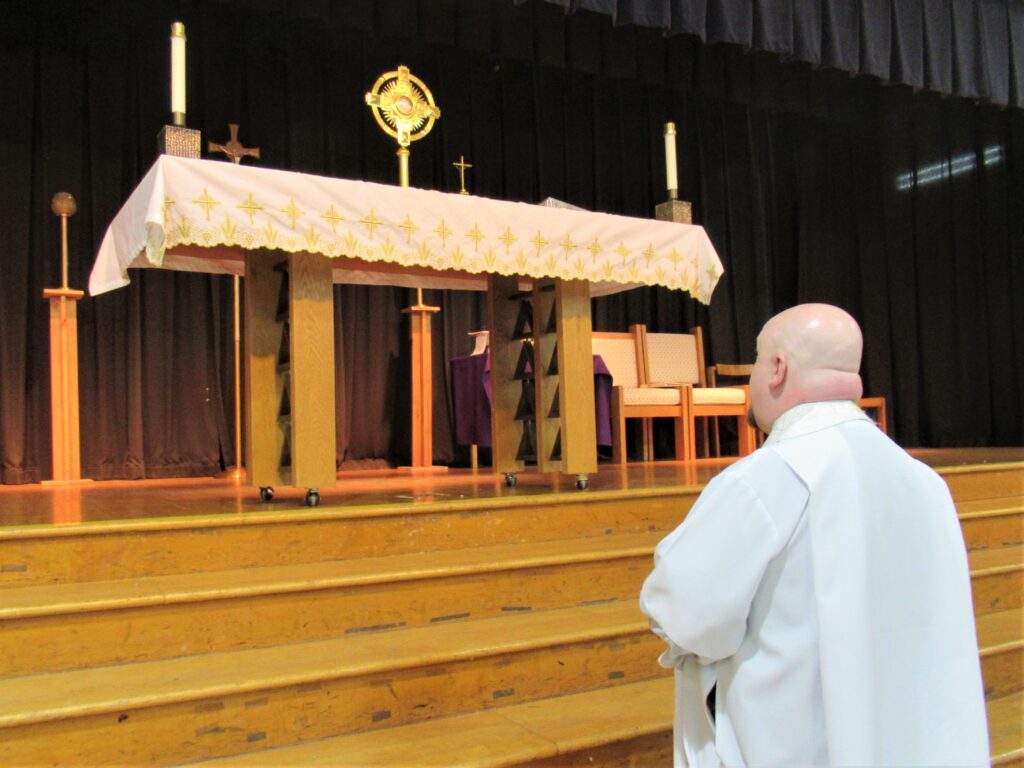
The conference included Exposition of the Blessed Sacrament, morning prayer and benediction with Father Furlong presiding, and Deacon Ed Laubacher of St. Paul Parish in North Canton leading the Liturgy of the Hours.
“I encourage you to make time to pray and let Jesus speak to you,” Father Furlong told those in attendance. “Make sure you are in God’s grace to receive the Eucharist. What a great opportunity to receive the Lord. And what a wonderful Church to provide this. By fervently adoring the Eucharist, you grow closer to Christ.”
Most of those attending were enthusiastic in response to the conference.
“This was very good, it was a benefit to attend this Catholic Men’s Fellowship event,” said Paul Kane of St. Charles Parish in Boardman. “It was great that we could all get together in prayer.”
Gregory Frank, a member of St. Mary Church, Divine Mercy Parish, in Massillon, and past grand knight of Council 5582 Knights of Columbus, called the session “Very uplifting.” He added, “You could feel the spirit.”
Michael Heroux, of St. Joan of Arc Parish in Streetsboro, said the event was wonderfully coordinated, planned and executed. “I look forward to sharing this with my fellow knights and Renewal members.”
Jim Stein of St. Christine Parish in Youngstown said “I thought it was great! A shot in the arm to revitalize our spiritual life and to bring it back to our families and parishes. It was good to be with like-minded men.”
Finding the programs “inspirational,” Josh Mansfield of the Basilica of Our Lady of Mount Carmel in Youngstown said, “This was definitely something the men of the Diocese of Youngstown needed to hear and live out.”
Mark Violand, president of Youngstown Catholic Men’s Fellowship, said many men used to attend conferences in the Cleveland Diocese, until Bishop George Murry wanted to start an organization for the Youngstown Diocese. The first local conference was held at Walsh University in 2012. Events have been held every year, except during the pandemic, most recently at St. Thomas Aquinas High School in Louisville. This was the first conference at John F. Kennedy High School in Warren.
“First, it’s fellowship, it’s the one thing we work for,” Violand said. He added that parishes have Catholic Men’s Fellowship small groups and sometimes hold mini-retreats. “It’s getting men together to get excited about being a good men, spouses, grandfathers—and taking that desire to parishes,” he said. “Our priests need us, our deacons need us. How can we support our parishes? How can we support our priests?”
